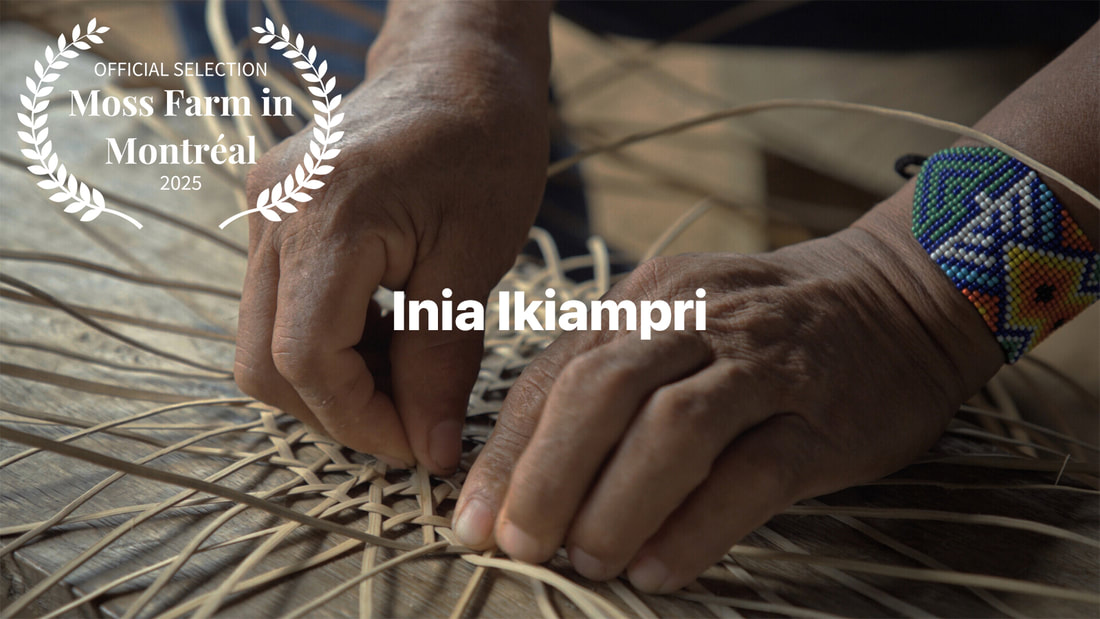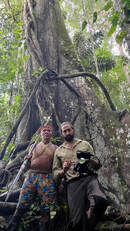
Inia Ikiampri
A thriving Indigenous community in the Ecuadorian Amazon clings to tradition and connections to land while preparing for an uncertain future.
In an intimate “Day in the Life” of the Achuar people, Inia Ikiampri follows members of the Kapawi community in Achuar Territory in the Amazon Basin of Ecuador portraying how different generations go about their lives in the heart of the Amazon forest. The film explores themes of Achuar land, language and culture at the intersection of tradition and modernity.
Country of Origin: Equador
KYNAN TEGAR, Director
In an intimate “Day in the Life” of the Achuar people, Inia Ikiampri follows members of the Kapawi community in Achuar Territory in the Amazon Basin of Ecuador portraying how different generations go about their lives in the heart of the Amazon forest. The film explores themes of Achuar land, language and culture at the intersection of tradition and modernity.
Country of Origin: Equador
KYNAN TEGAR, Director

Documentarian Martin Kingman was born near Macas, Ecuador, between the eastern side of the Andes and the northwestern edge of the Amazon basin. As a child, his parents worked as part of a growing social movement to establish strong local Indigenous governments to provide autonomy and land protection. Drawn to the waters of the many rivers snaking throughout the region, he became a strong swimmer and was named to the Ecuadorian Olympic swim team in his youth. He also became enamored with photography and followed his older brother, nature photographer Santiago Kingman, into the animal and human communities of the area.
In the early 2010s he gave up swimming and decided to pursue visual storytelling full time. He enrolled in writing and filmmaking courses at the Universidad de Las Americas, and then the INCINE Institute in Quito. Since graduating, Martin has dedicated himself to partnering with the indigenous peoples of Ecuador and Peru, bringing to life for audiences around the world the thriving cultures of the Waorani, Siona, and Achuar Nations, among others. He has shot and directed dozens of films of different lengths as well as impactful ad campaigns, including recent PSAs that helped pass the historic vote to ban oil exploration in Indigenous-held Yasuni National Park.
Director's Statement:
My connection with Amazonian cultures dates back to my childhood. While growing up in the region of Macas my parents supported the formation of strong indigenous governments capable of resisting mineral and oil extraction. I remember their long discussions on how to sustain and strengthen their identity, language, and spirituality. I also remember the communities we visited, where I learned to appreciate their food, the chewed yuca beverage known as Chicha, their intense social relationships, and their extensive knowledge of thousands of animals and plants. As we walked amidst towering trees, bird songs, and mammals, I learned to respect their water, forest, and vegetable garden spirits.
Fifteen years earlier, like most young Amazonians, I left my small town near Macas to study in the capital of Quito, spending a six long and challenging years in an urban environment with all its traffic and modern conveniences. Upon completing my studies, I embarked on a new personal quest, which led me to reestablish my connection with Indigenous Peoples. During this return to my roots, I began practicing extreme river kayaking, which deepened my connection with water and Amazonian landscapes. This bond, along with cinema, led me to collaborate with various organizations and Indigenous Peoples, such as the Waorani, Siona, Siekopai, Cofán, Awá, Épere, among others. I have also had the opportunity to share my audiovisual knowledge with indigenous youth, assisting them in telling their personal stories and diverse struggles through the creation of their own documentary projects. Among the most powerful experiences has been the co-creation of the film Inia Ikiamri with the Achuar Nation, a collaborative journey with families, shaman, fisherman and the incredible women at the heart of Achuar culture. Working with them as part of the global Wayfinders Circle initiative has reinforced my beliefs that Indigenous wisdom and lifeways can get us out of this climate crisis.
In addition to collaborating on stories about the Achuar’s lives, customs, and spirituality, we also worked together to document their social movement of protest, demand, and resistance. Recently, I participated in an extensive communication campaign that, through indigenous voices, called on the citizens of Ecuador to vote to halt harmful extractive practices in Yasuní National Park. In a historic vote, nearly six out of every ten Ecuadorians chose to keep the oil underground and preserve the most biodiverse place on the planet.
In the early 2010s he gave up swimming and decided to pursue visual storytelling full time. He enrolled in writing and filmmaking courses at the Universidad de Las Americas, and then the INCINE Institute in Quito. Since graduating, Martin has dedicated himself to partnering with the indigenous peoples of Ecuador and Peru, bringing to life for audiences around the world the thriving cultures of the Waorani, Siona, and Achuar Nations, among others. He has shot and directed dozens of films of different lengths as well as impactful ad campaigns, including recent PSAs that helped pass the historic vote to ban oil exploration in Indigenous-held Yasuni National Park.
Director's Statement:
My connection with Amazonian cultures dates back to my childhood. While growing up in the region of Macas my parents supported the formation of strong indigenous governments capable of resisting mineral and oil extraction. I remember their long discussions on how to sustain and strengthen their identity, language, and spirituality. I also remember the communities we visited, where I learned to appreciate their food, the chewed yuca beverage known as Chicha, their intense social relationships, and their extensive knowledge of thousands of animals and plants. As we walked amidst towering trees, bird songs, and mammals, I learned to respect their water, forest, and vegetable garden spirits.
Fifteen years earlier, like most young Amazonians, I left my small town near Macas to study in the capital of Quito, spending a six long and challenging years in an urban environment with all its traffic and modern conveniences. Upon completing my studies, I embarked on a new personal quest, which led me to reestablish my connection with Indigenous Peoples. During this return to my roots, I began practicing extreme river kayaking, which deepened my connection with water and Amazonian landscapes. This bond, along with cinema, led me to collaborate with various organizations and Indigenous Peoples, such as the Waorani, Siona, Siekopai, Cofán, Awá, Épere, among others. I have also had the opportunity to share my audiovisual knowledge with indigenous youth, assisting them in telling their personal stories and diverse struggles through the creation of their own documentary projects. Among the most powerful experiences has been the co-creation of the film Inia Ikiamri with the Achuar Nation, a collaborative journey with families, shaman, fisherman and the incredible women at the heart of Achuar culture. Working with them as part of the global Wayfinders Circle initiative has reinforced my beliefs that Indigenous wisdom and lifeways can get us out of this climate crisis.
In addition to collaborating on stories about the Achuar’s lives, customs, and spirituality, we also worked together to document their social movement of protest, demand, and resistance. Recently, I participated in an extensive communication campaign that, through indigenous voices, called on the citizens of Ecuador to vote to halt harmful extractive practices in Yasuní National Park. In a historic vote, nearly six out of every ten Ecuadorians chose to keep the oil underground and preserve the most biodiverse place on the planet.
